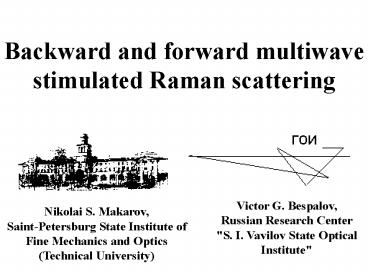Backward and forward multiwave stimulated Raman scattering - PowerPoint PPT Presentation
1 / 10
Title:
Backward and forward multiwave stimulated Raman scattering
Description:
Saint-Petersburg State Institute of Fine Mechanics and Optics (Technical University) ... shift frequency, ji are the wave mismatchings and T2 are the dephasing times. ... – PowerPoint PPT presentation
Number of Views:106
Avg rating:3.0/5.0
Title: Backward and forward multiwave stimulated Raman scattering
1
Backward and forward multiwave stimulated Raman
scattering
Victor G. Bespalov, Russian Research Center "S.
I. Vavilov State Optical Institute"
Nikolai S. Makarov, Saint-Petersburg State
Institute of Fine Mechanics and Optics (Technical
University)
2
Abstract
Stimulated Raman scattering (SRS) is widely used
for frequency conversion and multiple wavelengths
generation. Due to difficult SRS experiments it
is interest the numerical simulation of multiwave
SRS for optimizing the conditions for
simultaneously generation of Stokes and
anti-Stokes SRS components. First, the model of
SRS described the energy exchange between pump
and Stokes waves was presented, then this model
was enlarged for the case of multiwave
interaction taking into account the generation of
high-order Stokes and anti-Stokes SRS components.
However, this model describes only the
interaction between forward SRS components and
does not take into account the generation of
backward Stokes wave, while at the experiments in
compressed gases the researchers observes the
simultaneously generation of forward and backward
SRS components. So for numerical simulations of
backward SRS one used the system of connected
differential equations, described the interaction
of forward pump and backward Stokes wave. In this
work we present a new system of connected
differential equations for complex amplitudes of
forward and backward interacting waves described
multiwave backward and forward stimulated Raman
scattering, where Ej? are complex amplitudes of
interacting waves (() corresponds forward
components and (-) corresponds backward
components), gj? are Raman gain coefficients, q?
are complex amplitudes of phonon wave, ?j?0j??,
?0 is the frequency of pump wave, ?? is the Raman
shift frequency, ?ji are the wave mismatchings
and T2? are the dephasing times. This system is
the extension of multiwave SRS model and it may
be reduced to well-known systems of forward
multiwave SRS and backward SRS. Preliminary
simulations with 2 Stokes (forward and backward)
and 1 anti-Stokes SRS components were compared
with experimental results with nanosecond-pumped
SRS in compressed hydrogen. The results of
numerical simulations are quantity and quality
agreed with experimental results.
3
System of forward and backward multiwawe SRS
equations
4
Used notifications
?ji wave mismatching, gj steady-state Raman
gain coefficient, ?j frequencies of interacting
waves, Ej complex wave amplitudes
5
Raman gain dispersion
Barium nitrate
Hydrogen
6
Model verification waves profiles at different
input pump intensities (left input pump and
right output pump)
7
Model verification waves profiles at different
input pump intensities (left output forward
Stokes and right output backward Stokes)
8
The power profiles of interacting waves at
forward and backward SRS in hydrogen
9
Conclusions
- Our model of forward and backward multiwave SRS
is the extension of multiwave SRS model and it
may be reduced to well-known systems of forward
multiwave SRS and backward SRS. - Our model of forward and backward multiwave SRS
is quality and quantity compared with
experimental results - For best accuracy of QPM SRS simulations it is
necessary to take into account the dispersion of
Raman gain coefficient - Then the input pump intensity is near threshold,
than the radial profile of waves can be neglected
due to smooth changes of output waves on input
intensity changes - Then the input pump intensity is much more than
threshold, than the radial profile of waves must
be taken into account due to jump changes of
output waves on input intensity changes
10
References
- Armstrong J.A., Bloembergen N., Ducuing J.,
Pershan P.S. // Phys. Rev., 1962, 127, pp.
1918-1939. - Bespalov V.G., Makarov N.S. Quasi-phase matching
generation of blue coherent radiation at
stimulated Raman scattering // Optics
Communications 2002, 203 (3-6), pp. 413-420. - Maier M., Kaiser W., Giordmaine J.A. Backward
stimulated Raman scattering // Phys. Rev., 1969,
V. 177, ?2, pp. 580-599. - Raijun Chu, Morton Kanefsky, Joel Falk Numerical
study of transient stimulated Brillouin
scattering // J. Appl. Phys., 1992, V. 71, ?10,
pp. 4653-4658. - Zaporozhchenko R.G., Kilin S.Ya, Bespalov V.G.,
Staselko D.I. Formation of the spectra of
backward stimulated Raman scattering from the
quantum noise of polarization of a scattering
medium // Opt.Spectr., 1999, V. 86, ?4, pp.
632-639. - Bischel W.K., Dyer M.J. Wavelength dependence of
the absolute Raman gain coefficient for the Q(1)
transmission in H2 // J. Opt. Soc. Am. B, 1985,
V. 3, pp. 677-682.































